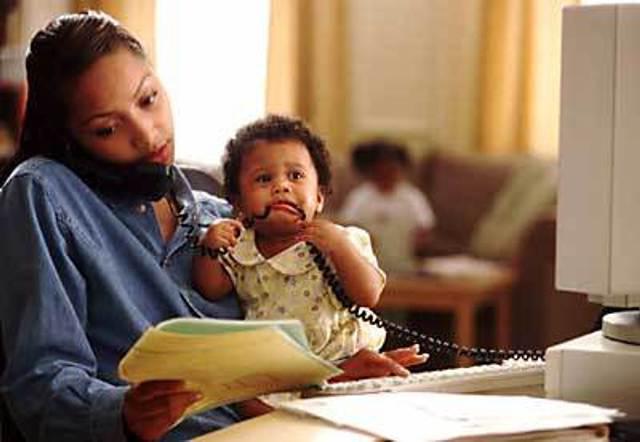Today, a woman whose child was born out of wedlock cannot be called an outcast: such is her personal choice. The society reacts to such a situation very tolerantly, if we take into comparison the very recent past. With regard to legislation, it clearly shows the attitude of the state towards single-parent families. Which families are considered as such? Where to apply for single mother status? Under what circumstances is it lost? You can find answers to these and other equally serious questions in the process of familiarization with the materials of this article.
Single mother: who is considered such?

Consider in what cases a woman can get the status of a single mother. Today it is often possible to observe a situation when a woman independently raises her own child after a divorce or the death of her spouse. Is she considered a single mother? It is important to note that in the Russian family law neither the definition of “single mother” nor the definition of “single mother” is given, however, it is present in many other acts of a legal and subordinate nature, as well as in resolutions of federal units.
So, let us consider in more detail such a concept as a single mother. Who is considered her? Based on laws and regulations, it can be concluded that a single mother is none other than a woman who gave birth to a child without marriage. In addition, there should be no indication of paternity in the birth certificate of babies. By the way, the father can also be called from the words of the mother (form 25 confirming the status of a single mother) It must be added that the status in question can also be granted in the following situations:
- A mother who gave birth to a child three hundred or more days after the divorce procedure.
- In the case of contesting the paternity of a child born in a marriage, or less than three hundred days before the divorce procedure.
Form 25 Confirming Single Mother Status, assumes that in other cases the status in question is not confirmed. Among them may be a divorce, the death of a husband or the deprivation of his parental rights. Nevertheless, this is not at all equivalent to the fact that the state throws such women to their fate. They have a different status. That is why state support in the cases presented is implemented in slightly different directions and legal standards (alimony, benefits).
Single mother status: how to get it?

In order to obtain the status of a single mother, it is necessary to apply to the territorial bodies of social protection of the population. This is where you can get the appropriate certificate. In addition to the application for status, the following should be submitted to the structure documents for a single mother:
- Identity document (passport).
- Birth certificate of a child.
- Extract from the personal account and the house book.
- A work book for those who are not registered at the employment center.
- The following types of help: form 25 confirming the status of a single mother; income statement; certificate from the employment center when a woman is listed as unemployed; certificate of family composition.
In addition, all the smallest details must be found out in the public service of social protection of the population.Not all women need a certificate, as the documentation listed above is sufficient for assigning benefits in any case. What should be for single mothers? Single mothers, as a rule, receive benefits for childbirth and pregnancy, as well as for caring for a child under 1.5 years old (as well as all other women). Of course, local payments also join them.
Single Mother Status

So, what does the status of “Single Mother” give? How to get it? First of all, it is necessary to understand that this status can be acquired under the following circumstances:
- In case of adoption of a child out of wedlock.
- The absence of an official father in the child. In other words, the man did not submit an application to the registry office, and also did not determine paternity through the judiciary.
- Exclusion of marriage (to confirm this condition is necessary certificate of marriage).
- The exception in the birth certificate of the baby is the record about the father (a dash on this place) or the record of the father according to the mother.
In the process of issuing a birth certificate, the mother should immediately receive a certificate of a certain sample from the registry office. It is nothing but form 25 confirming the status of a single mother. It is important to note that when a mother applies for confirmation of status only after some time, the registry office employees undertake to raise the necessary documentation and issue a certificate. By the way, in most regions this service is paid.
Today, people are often interested in how to obtain status and what confirms the status of a single mother. It must be borne in mind that these concepts are equivalent. So, a certificate from the registry office guarantees both receipt and confirmation.
Required Documentation
What should be for single mothers? To receive child allowance every month (in the case of per capita income below the subsistence level in Russia), a single mother must be registered with the state structure of social protection in accordance with the place of registration. To do this, she needs to provide the following documentation:
- A certificate confirming the fact of the birth of the baby.
- Certificate issued in accordance with the twenty-fifth form of the registry office.
- Help about the cohabitation of the baby with the mother.
- Help per capita income on average.
- Copy of passport.
- Workbook (necessary only for registering benefits at the regional level).
It is important to note that the preparation of benefits for a child up to sixteen years in double size is carried out in the manner established by law (for example, large single mother) It should be added that the main legislative act in this case is the Federal Law “On State Benefits for Children with Children”.
Difficulties in confirming single mother status

After considering which gives single mother status, it would be appropriate to indicate the difficulties that may arise in confirming the status in question. Among them are the following items:
- Misunderstanding of the meaning of this status, because the widows do not fit under it; divorced women; women whose children have a father appointed by court.
- Difficulties with state structures for social protection of the population in accordance with the actual place of residence, because they are not entitled to assign child benefits, because the place of registration is not included in their district.
- Citizens wishing to receive help for single mothers on the part of the state, they often encounter difficulties in the process of issuing a certificate regarding cohabitation with a baby (in different regions, the powers related to the issuance of such a certificate are to be divided between different school institutions and departments, the social welfare department, the department of guardianship and trusteeship, as well as the passport office).It should be added that the necessary information can be provided by employees of the state service of social protection of the population, where the benefits are processed.
Legal and factual recognition

Single mother ... In Russia a couple of decades ago, this concept sounded almost like a sentence. So, a woman who decided to give birth to a child out of wedlock was considered dishonorable and immoral. Fortunately or unfortunately, those times are behind us, and single mothers have earned respect in society. In addition, today the state provides help for single mothers.
However, absolutely any social status in the Russian Federation should be endowed with not only visible (actual) grounds - it must be confirmed in an official way. In other words, not every woman raising a child or children on her own is considered a single mother at the legislative level. It would be advisable to consider this issue in more detail.
Single mother by law
A single mother (less commonly a single father) belongs to a socially unprotected category of people who in one way or another enjoys the support and privileges of the state. At the level of legislation, this category includes:
- Women who have given birth to a child out of wedlock and do not have official confirmation of paternity. It is important to add that only those cases are considered when in the column of the birth certificate of the baby under the name "father" there is a mark "taken into account from the words of the mother" or a dash.
- Women who have given birth to a child within three hundred days from the date of divorce. They have no confirmation of paternity.
- Women who have adopted or adopted a child out of wedlock.
- Women who have given birth to a child married or before the expiration of three hundred days after the divorce procedure. They have no confirmation of paternity (the corresponding fact is officially contested by the father).
It is necessary to add that in all the situations listed above, the status of “Lonely mother” is acquired automatically, and the woman is directly vested with the right to receive subsidies and benefits from the state, which are drawn up exclusively upon personal appeal to the social welfare department.
Cases not covered by law

Today, society often does not distinguish between the legal categories of a single mother and the actual (but not protected by law) single parenting of a child or several children. The following are a few cases where the definition considered in the article is excluded:
- Women who have given birth to a child out of wedlock, however, have evidence of paternity in fact (that is, the father officially recognized the child or this fact was proved through an appeal to the judiciary).
- Women who are divorced and independently raise their children. In such circumstances, the former spouse is obligated to pay alimony for each of the children every month. If the ex-husband has died, from the state the family is provided with benefits related to the loss of the breadwinner.
- The loss of the status of a single mother is relevant upon marriage after the birth of the child. In this case, a woman should have in her hands an appropriate document confirming paternity on the part of the new spouse (that is, the establishment of paternity voluntarily by the non-biological father).
- Widows who raise children are not classified as single mothers. They have the right to receive a monthly benefit related to the loss of a breadwinner for each child.
It is important to note that, being a single mother and having entered into marriage at the level of the law, but not having established the fact of recognizing paternity as a newly-married spouse, the woman continues to enjoy the status of a “single mother,” which, incidentally, does not apply to subsequent children.
Prioritize
Before each woman who falls into the category in question, in any case, the question arises about the information that must be submitted to the registry office. What decision to make: put a dash (note the absolute absence of the father) or write down a certain F. I. O? It will be advisable to consider all the advantages and disadvantages of each of the presented positions, as well as the corresponding consequences, which are both positive and negative.
Earlier it turned out that every woman who decided to raise her baby and take full responsibility for him on his own shoulders has the right to put a dash in the column about the father’s data. So, even if the father is alive and well, however, for obvious reasons, the mother does not want to allow even the slightest presence of him not only in her life, but also in the baby’s life, no one will ever be able to force her to fix the name of the biological father of the child in official documentation.
Nevertheless, going for it, a woman should think not only about herself. The fact is that her child (even if born out of wedlock and not recognized as a biological father at the moment) after a certain period of time can become a contender for an inheritance that will somehow open immediately after the death of her father. Proof of kinship can be a genetic examination. In the case of putting a dash in the appropriate column, it will be much more difficult for the child to defend his own interests, and if you look at the problems from a practical point of view, it is completely impossible.
Second option

What does the second case suggest, consisting in the recording of specific information about the father (surname, name, patronymic) from the mother? It is necessary to make a reservation right away that a woman should not expect any alimentary payments, benefits and other compensations from the father indicated in the documentation, because there is no reason for that. All of the above can be claimed only after judicial proof (recognition) of the fact of paternity. So, this confirmation serves as a tool for translating women from the legal category of “single mothers” to the actual one. In other words, a single mother has the right to mention absolutely any father in the birth certificate of a baby, but neither she nor the child has the right to take advantage of this paternity until judicial proof of biological relationship is made.
It’s no secret to anyone what significant power today in Russia is possessed by the various subtleties of the bureaucratic orientation and the delays generated by them. This is exactly what happens in the case of a certain (very possibly even fictitious) father. In the life of a baby, and later - a fairly independent teenager, nuances may arise when there is a need for the permission of both parents. For example, a mother raising a child on her own does not have the right to leave the country with him without the permission of her father, formalized and confirmed in an official way. Or it’s not a very pleasant, but quite strong example: the intervention of doctors in the baby’s health in especially serious situations, one way or another, involves notarized consent of both the mother and father. It is very difficult to imagine how much worries, hassle and nervousness a single mark registered in the documentation may entail. That is why the registry office employees, who periodically encounter such phenomena, often recommend single mothers to immediately put a dash in the appropriate box. The decision, of course, remains with the single mother. And the only, perhaps, valid argument is the impossibility, without writing in the column “father”, to defend one's own inheritance right for the child.
It follows from the foregoing that today millions of women in the Russian Federation are forced to take on several family and social roles at once.For better or worse, each person decides for himself. However, one way or another, with a positive decision or forced circumstances, it is necessary to know all the rules and nuances of the procedure so that there are no problems.